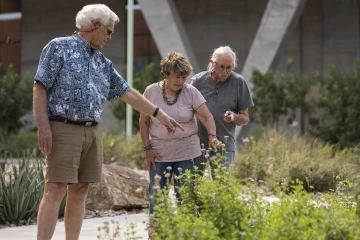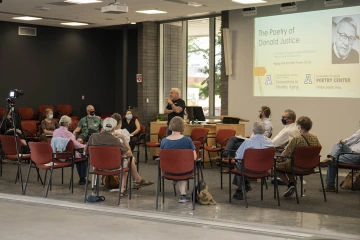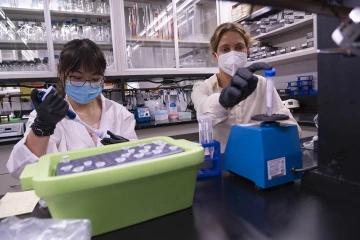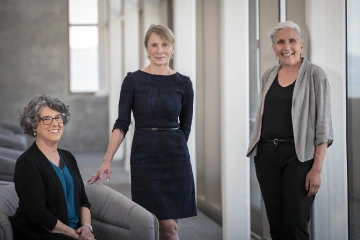Improving Life for an Aging Population
Researchers across the university are collaborating to enhance the lives of older adults through integration, partnerships, research and education.
A profound shift in the U.S. population is bringing unprecedented changes in American life and what it means to be an older adult. Over the past decade, the number of older adults in the U.S. grew by a third to more than 54 million, including a 52% increase in Arizona’s older adult population. U.S. Census data show that by 2034, the number of Americans age 65 and older will for the first time outnumber those under 18.
Experts at the University of Arizona Health Sciences are leading a university-wide, collaborative effort to navigate this massive population shift through a new strategic initiative, Innovations in Healthy Aging. Researchers, professors and leaders in diverse professions such as public health, nursing, pharmacy, medicine, geriatrics, engineering, law and architecture are building networks and developing solutions for people to live their best lives as they age.

Innovations in Healthy Aging hopes to integrate older adults into the university community through organized activities that are designed to promote well-being and counteract the emotional shifts that may arise as people age.
The initiative’s goals are to enhance the health of an aging population by creating inclusive, safe and supportive environments that encourage physical activity, healthy nutrition, social interaction and engagement; and to promote independence, self-management and a continuing sense of purpose by leveraging technology and providing physical, emotional and cognitive support.
“More people are living for a longer period of time, which is a great thing,” said Kathleen Insel, PhD, RN, a professor at the UArizona College of Nursing. “As people live longer lives, the challenge for us as a society is to develop ways to benefit from the wisdom and experiences of older adults, while at the same time growing the workforce to support an aging population, and creating educational opportunities and improving quality of life for older adults.”
Building connections to promote healthy aging
Approximately 24% of people 65 and older report being socially isolated, with 43% of adults over the age of 60 reporting feeling lonely, according to a 2020 study by the National Academies of Sciences, Engineering and Medicine. One goal of Innovations in Healthy Aging is to create an environment where older adults can become part of the university community.
“We have a rapidly growing aging population that really needs us to come up with solutions – now.”Mindy Fain, MD
To that end, UArizona Health Sciences leaders are pursuing the Age-Friendly University designation from the Gerontological Society of America and its Academy for Gerontology in Higher Education. The designation is earned after meeting 10 principles that promote age inclusivity, such as engaging the local retired community, widening educational opportunities for adults and ensuring the university's research agenda is informed by the needs of older Americans.
Older adults will be invited to participate in a variety of events that promote healthy aging. Some activities, such as poetry circles and classes that promote physical movement and use music to connect with the university, are already engaging the local community.
Developing healthy aging solutions through research
“How do we help people be at their peak, regardless of the challenges they face?” asked Esther Sternberg, MD, associate director of research for Innovations in Healthy Aging and a professor at the UArizona College of Medicine – Tucson. “No matter their age, their circumstances, their socioeconomic status, their educational level – how do we help them to be their best self?

Activities such as poetry circles encourage social interaction and engagement, which can help counteract the loneliness and social isolation many older adults feel.
“We have expertise across the university – a growing and critical mass of amazing researchers, clinicians and educators – who are positioned to make an impact through research. The Innovations in Healthy Aging research component is already supporting efforts through Healthy Aging Seed Grants and workshops that will bring researchers together across the university to solve the complex problems of aging.”
Researchers including BIO5 Institute members Roberta Diaz Brinton, PhD, director of the UArizona Health Sciences Center for Innovation in Brain Science, Janko Nikolich-Zugich, MD, PhD, co-director of the UArizona Center on Aging and head of the Department of Immunobiology in the UArizona College of Medicine – Tucson, and Carol Barnes, PhD, Regents Professor of psychology in the UArizona College of Science, are among faculty members helping define what it means to age well.
Through a $60 million grant from the National Institutes of Health, Dr. Barnes will lead the Precision Aging Network, which will bring together researchers from across the country to better understand how and why people experience brain aging differently, with the ultimate goal of developing more effective treatments and interventions targeted to the individual.
Other research will focus on creating environments, whether inside or outdoors to optimize health and well-being. It’s an area of expertise for Dr. Sternberg, who also is founding director of the UArizona Institute on Place, Wellbeing and Performance, research director at the UArizona Andrew Weil Center for Integrative Medicine and a member of the BIO5 Institute.

From left: Undergraduate student Emily Ngu assists Jennifer Stern, PhD, assistant professor of endocrinology in the UArizona College of Medicine – Tucson, who is using a Healthy Aging Seed Grant to study the effects of enhancing glucagon sensitivity at the liver through caloric restriction, with the goal of identifying a therapeutic target to prevent age-related metabolic disease.
“We hope in the next five years wearable devices will send signals on the status of your health, not just physical activity – which is what the current wearable devices do – but posture, sleep quality, stress and heart rate variability,” she said, adding that the future of smart buildings will be to offer automatic adaptive environments using that data.
Eventually, UArizona Health Sciences researchers hope to work with community leaders to help create a senior living residence that would provide optimal support for older adults, including integrated monitoring devices and adaptive technologies.
“The aging population is increasing every year in developed and developing countries,” said Altaf Engineer, PhD, assistant professor in the UArizona College of Architecture, Planning and Landscape Architecture and research faculty at the Institute on Place, Wellbeing and Performance. “Everything we are doing today in the field of the built environment, which includes state-of-the-art technologies, construction methods, building systems and technologies, need to be geared toward the aging population. If you design for age-friendly environments, these will also be conducive to the health and well-being of the rest of the population.”
Educating with a focus on healthy aging
Workforce development is an important component in meeting the needs of an aging population, and one Innovations in Healthy Aging is addressing through education and training.

From left: Esther Sternberg, MD, Kathleen Insel, PhD, RN, and Mindy Fain, MD, are bringing together aging experts from across the university and creating community networks and partnerships to support the needs of an aging population through Innovations in Healthy Aging.
“Clinicians, students and trainees of all disciplines need to be prepared to address the complex needs of older adults,” said Mindy Fain, MD, co-director of the UArizona Center on Aging and the Anne and Alden Hart Endowed Chair in Medicine. “We want to promote students and trainees in the pursuit of a career in aging. We have a rapidly growing aging population that really needs us to come up with solutions – now.”
One way educators are doing that is through the development of curricula specific to aging. Many of the faculty involved in Innovations in Healthy Aging also are involved with another strategic initiative, UArizona Health Sciences International.
Earlier this year, Health Sciences International unveiled a graduate certificate in aging to better prepare students to meet the needs of an aging population. A master’s degree in aging is currently in development, and the hope is that students will eventually be able to complete a doctorate in aging at UArizona Health Sciences.
Contact
Margarita Bauzá
520-621-7246
mbauza@arizona.edu

